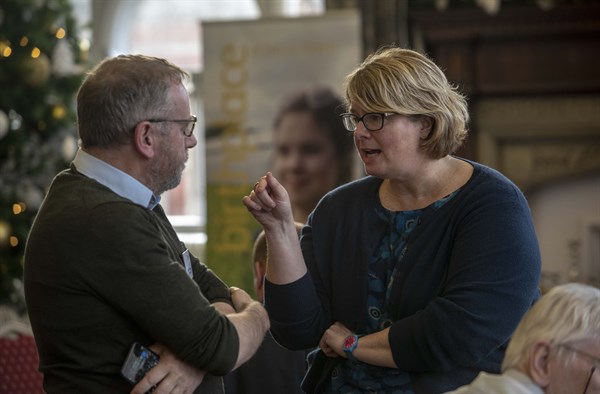Superwood: event report, photo gallery, presentations, your feedback and more
9 January 2019
The "stars are aligned" for the forestry and wood-using industry to take advantage of an increasingly favourable climate towards tree planting and timber construction - but it's time to make it happen.
That was the conclusion at the end of a very positive day of discussions at the Superwood conference in Newcastle upon Tyne.
A wide range of delegates from the entire forestry and wood supply chain - plus politicians, environmental NGOs, academics, students, timber construction experts and many more - came together to discuss how forestry and wood could drive a low-carbon economy. Read what delegates said
The imperative to plant more trees and use more wood to help fight climate change was a common theme throughout the day, with Paul Brannen, MEP for North East England saying: "The sector has never been in a better place and must not miss the opportunity. The stars are aligned and we need to make it happen - but in terms of climate change, time is running out. We need to plant more trees now."

Mike Childs, Head of Science, Policy and Research at Friends of the Earth, said his organisation would be campaigning to drive up tree planting and wood use in 2019 as part of a new campaign to tackle climate change. The organisation wants to double the UK's tree cover, which is currently 13 per cent.
Stuart Goodall, Chief Executive of Confor, welcomed Mr Childs' comments and the growing recognition that forestry and wood are crucial to meeting climate change objectives. He described a positive meeting with the RSPB and agreed with Paul Brannen that the area of crossover between the industry and environmental NGOs needed to be bigger. "We have made good progress, but need to develop more partnerships to deliver more tree planting, build more with wood and have a real impact on climate change," he said. [Hear Stuart's interview with Farming Today on the morning of the conference here]
In terms of new planting, Peter Jackson - leader of Northumberland County Council - pledged to support moves for a Forestry Investment Zone (FIZ) in the county to drive more productive planting in the North East. Councillor Jackson said he wanted to make Northumberland "the forestry friendly county" and pledged to work with the industry to make it happen. Read more about what was said on FIZs here
Beccy Speight, CEO of the Woodland Trust, said there was a definite place for commercial forestry in delivering the Northern Forest project, which aims to plant 50 million trees across the North of England (although not as far north as Northumberland). She said it was important to build on very positive collaboration with Confor to make this happen and urged the industry to come up with projects to plant at scale - and to identify a site for a FIZ in the Northern Forest area.

Another theme of the event was the rapidly increasing demand for wood. Simon Hart of EGGER said a strong, long-term wood supply was crucial to businesses like EGGER and that we had to find more sites to plant to make sure this happened.
Mr Hart said that we had to look very carefully at the wide range of designations [in areas like Northumberland] which made it difficult to plant trees - and ensure that these designations were fully justified, and balanced against the multiple benefits delivered by forestry.
Dr Dan Ridley-Ellis, of Edinburgh Napier University, said there was a strong push for wood use in the growing bio-economy. While there were huge opportunities, he stressed that we had to be realistic: "Wood is abundant - but abundant does not mean limitless."
Adam James returned to his home city from British Columbia (BC), where modern timber construction is the heartbeat of a low carbon economy. Mr James, who worked on the project to create the tallest wooden building in the world (an 18-storey student accommodation block in Vancouver) said there was a presumption to build with wood in BC.
"If you don't build with wood, you have to explain why," he said. "We have public policy in favour of building with wood and an education and skills system aligned with that. When you have that, projects happen in the middle." Mr James said offsite construction was making a significant impact on build times in British Columbia, with the 18-storey student block completed in just nine weeks. Read more about the project here.
Neil Sutherland of MAKAR, based in the Scottish Highlands, reminded delegates that 80 per cent of homes in Scotland were made using timber frames, but only around 15 per cent in England. There was a real challenge in breaking through in terms of using much more timber because the high-volume housebuilders were not bought into the agenda, he added.
Rob Allen, of Citu, outlined his company's vision of using timber to unlock the carbon-negative home. He said continuing to build traditional masonry houses was totally unsustainable in terms of tackling climate change - as a typical house 'cost' 65 tonnes of carbon dioxide, while Citu had calculated that one of its homes could actually 'save' 23 tonnes of carbon when all factors were taken into account.
Read the Twitter highights of the Superwood event here

